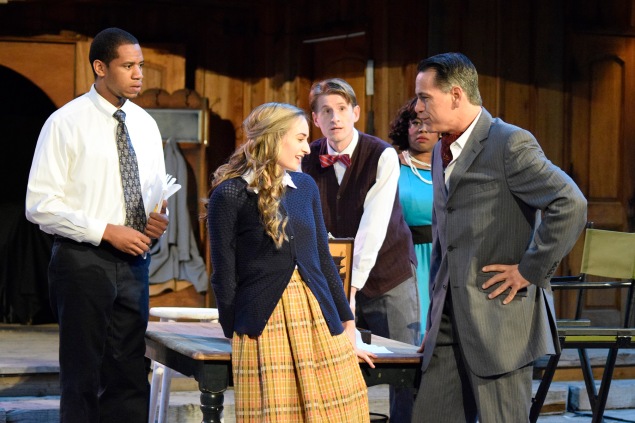
If Alice Childress had been more amenable to producers’ suggestion that she amend the text of her brilliant play, Trouble in Mind, and make it a “heart-warming little story,” she would have been the first female African American playwright to debut on Broadway. Instead, Lorraine Hansberry’s A Raisin in the Sun broke that barrier in 1959. Written in 1955, Trouble in Mind opened off Broadway and ran for ninety-one performances at Greenwich Mews Theatre, garnering an Obie Award for best original off-Broadway play of the season.

Theatricum Botanicum’s production of Trouble in Mind boasts a terrific cast of superb players who bring the play vividly to life with comedic hilarity and searing heart wrenching drama under the excellent direction of Ellen Geer. In the morning, a group of actors gather to begin rehearsals of a new play written by a white playwright that features a cast of mostly African American actors under the direction of a high strung, mercurial white director, Manners (Mark Lewis). Manners is self-righteous, believing himself to be one of the good guys by giving his actors jobs and a story that purportedly is anti-racist, when in fact it is a work of condescension.

First on stage, even before the audience has fully settled, the old stage-doorman, Henry (Rodrick Jean-Charles), sets a tone of joyous life, warmly greeting Wiletta (superb Earnestine Phillips), a powerful veteran performer who has had to play the stock roles available for a woman of color, but nonetheless has made a career out them. Other actors enter for the first day of rehearsal. John (Max Lawrence), a young actor in his first Broadway gig, gets educated by Wiletta in how to deal with a white director. Sheldon (Gerald C. Rivers), an older actor, low-key, and amiable, has a go-along-to-get-along attitude. Millie (elegant, effervescent Constance Jewell Lopez) is happy to have a job. White, pert and perky Judy (Judy Durkin), in from Bridgeport, Connecticut and fresh out of Yale Drama, catches the eye of the divorced director and gets some individual attention in an offstage dressing room. The director, Manners, also behaves like a condescending boor to his stage manager and general factotum, Eddie (Frank Weidner). Rounding out the cast, Bill O’Wray (Christopher W. Jones), is a successful actor and an unconscious, environmental racist typical of the time, the mid-1950s, who takes the role of a pistol packing Southerner.

The play the cast rehearses is set in the South in the time of the Montgomery bus boycott. It features stereotypical black characters, and is supposed to be seen as an enlightened subject of the time, and includes the climactic lynching of a major character. The actual theme of the framing play, however, is the power struggle between the director and his cast, who are expected to be slavishly subservient to their dominating director. Most are at least somewhat uncomfortable, but people need jobs. Wiletta, however, chafes under the bewildering direction of Manners, their conflict escalating to critical mass. Trouble in Mind starts as comedy then intensifies into searing conflict, rising to a stunning climax and a dramatic, uncertain dénoument. If ever a show is riveting, this is it. Again and again, this audience member leaned forward drawn by drama. And, at the sustained applause at the end, had a visceral response with eyes moist, not in sadness, but in emotional release, the classic catharsis.

Drive up Topanga Canyon, enjoy an evening under the stars, and experience the don’t-miss theatre that is Trouble in Mind, which runs in rotating rep with Midsummer Night’s Dream, The Merchant of Venice, Animal Farm, and Other Desert Cities, and closes on September 30 at Will Geer’s Theatricum Botanicum, 1419 N. Topanga Canyon Blvd. in Topanga, California.
